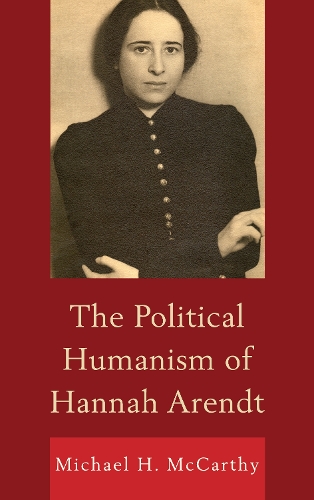
The Political Humanism of Hannah Arendt
(Paperback)
Publishing Details
The Political Humanism of Hannah Arendt
By (Author) Michael H. McCarthy
Bloomsbury Publishing PLC
Lexington Books
18th March 2014
United States
Classifications
Professional and Scholarly
Non Fiction
Medieval Western philosophy
Ethics and moral philosophy
Social and political philosophy
320.092
Physical Properties
Paperback
322
Width 154mm, Height 227mm, Spine 23mm
490g
Description
At the end of the Second World War when the horror of the holocaust became known, Hannah Arendt committed herself to a work of remembrance and reflection. Intellectual integrity demanded that we comprehend and articulate the genesis and meaning of totalitarian terror. What earlier spiritual and moral collapse had made totalitarian regimes possible What was the basis of their evident mass appeal To what cultural resources and political institutions and traditions could we turn to prevent their recurrence After years of profound study, Arendt concluded that the deepest crisis of the modern world was political and that the enduring appeal of political mass movements demonstrated how profound that crisis had become.
For Arendt the modern political crisis is also a crisis of humanism. The radical totalitarian experiment was rooted in two distorted images of the human being. The agents of terror believed in the limitless power generated by strategic organization, a power exercised without restraint and justified by appeal to historical necessity. The victims of terror, by contrast, were systematically dehumanized by the ruling ideology, and then brutally deprived of their legal rights and their moral and existential dignity. Arendts political humanism directly challenges both of these distorted images, the first because it dangerously inflates human power, the second because it deliberately subverts human freedom and agency.
This book offers a dialectical account of the political crisis that Arendt identified and shows why her interpretation of that crisis is especially relevant today. The author also provides detailed analysis and appraisal of Arendts political humanism, the revisionary anthropology she based on the politically engaged republican citizen. Finally, the work distinguishes the merits from the limitations of Arendts genealogical critique of our tradition of political thought, showing that she tended to be right in what she affirmed and wrong in what she excluded or omitted.
Reviews
This book is clearly the product of long rumination, the work of a scholar who has spent many years in the company of Arendts books. * The Review of Politics *
In this penetrating analysis, McCarthy reveals how anti-political biases within the Western philosophical tradition spawned 'anthropologies' that Arendt regarded as profoundly at odds with human dignity, plurality, and freedom. Rejecting both the reductionism that conflates people with beasts and the romanticism that conflates them with gods, Arendt emerges as a civic republican whose highest political virtue is devotion to a common world that, by uniting and separating us, allows us to actualize the full range of human possibilities. Lucid, unpolemical, and scrupulously fair, McCarthys book is scholarship at its best. -- Sandra K. Hinchman, St. Lawrence University
The Political Humanism of Hannah Arendt powerfully, honestly, and provocatively unites two core strands of Arendt's thinking. Arendt's humanism responds to the loss of the idea of humanity experienced in the rise of totalitarianism. Her political emphasis elevates freedom over security. Together, political humanism names Arendt's radical belief that being human is an activity of citizenship. This is a fresh and inspired account of Arendt's entire corpus that captures both the power and importance of her thinking. McCarthy writes in his own voice, seeking his way in the world and finding in Arendt a guide whose judgment of the world is harsh but not fatalistic. His book will appeal to scholars, but also to those who want, as did Arendt, to face up to, understand, and respond to our present challenges. -- Roger Berkowitz, Bard College
Author Bio
Michael H. McCarthy taught philosophy for thirty-eight years at Vassar College before retiring from teaching in 2007. He has been a visiting fellow at the Woodstock Theological Center at Georgetown University and a Lonergan Fellow at Boston College.
